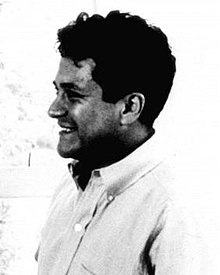Carlos Castaneda | |
|---|---|
 Carlos Castaneda in 1962 | |
| Born | Carlos César Salvador Arana December 25, 1925 Cajamarca, Peru |
| Died | April 27, 1998 (aged 72) Los Angeles, California, U.S. |
| Occupation | Anthropologist, writer |
| Nationality | American |
| Education | UCLA (BA, PhD) |
| Subject | Anthropology, ethnography, shamanism, fiction |
Carlos Castaneda (December 25, 1925[nb 1] – April 27, 1998) was an American anthropologist and writer. Starting in 1968, Castaneda published a series of books that describe a training in shamanism that he received under the tutelage of a Yaqui "Man of Knowledge" named don Juan Matus. While Castaneda's work was accepted as factual by many when the books were first published, the training he described is now generally considered to be fictional.[nb 2]
The first three books—The Teachings of Don Juan: A Yaqui Way of Knowledge, A Separate Reality, and Journey to Ixtlan—were written while he was an anthropology student at the University of California, Los Angeles (UCLA). Castaneda was awarded his bachelor's and doctoral degrees from the University of California, Los Angeles based on the work he described in these books.[6]
At the time of his death in 1998, Castaneda's books had sold more than eight million copies and had been published in 17 languages.[3]
- ^ a b Burton 1973.
- ^ Epstein, Benjamin (March 1, 1996). "My Lunch With Carlos Castaneda". Psychology Today. Retrieved February 23, 2015.
- ^ a b Applebome 1998.
- ^ Walters, Ray (January 11, 1981). "Paperback Talk". The New York Times. Archived from the original on February 23, 2015. Retrieved February 23, 2015.
- ^ Chávez Candelaria, Cordelia; Garcia, Peter J.; Aldama, Arturo J. (2004). Encyclopedia of Latino Popular Culture, Volume One. Greenwood. p. 114. ISBN 978-0-313-32215-0. Archived from the original on February 26, 2018. Retrieved February 22, 2015.
- ^ Marshall 2007.
Cite error: There are <ref group=nb> tags on this page, but the references will not show without a {{reflist|group=nb}} template (see the help page).